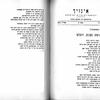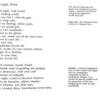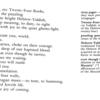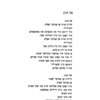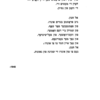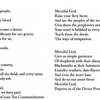1: "Poems (in Yiddish and English) with recordings, Yankev Glatshteyn's "Good Night, World" and Kadya Molodovsky's "God of Mercy."
Yankev Glatshteyn’s poem, "Good Night, World," was written in Yiddish in 1938, just before the start of World War II. Kadya Molodovsky (sometimes written Kadia Molodowsky), a Yiddish writer and one of Yankev Glatshteyn’s peers, wrote “El khanun” (“God of Mercy”) in 1944 just before the end of the war, when the full horror of the khurbn (Holocaust) and World War II was known.
Suggested Activity: Have students listen first to Yankev Glatshteyn reading “A gute nakht, velt,” recorded in 1955. If students can read Yiddish (or the Hebrew alphabet), they can follow along in the text. Students should pay attention to Glatshteyn’s tone of voice, volume, pacing, and repetition. Ask: What do you hear? What emotions do you hear present in the reading? Now have students read the poem in English. What do you think Glatshteyn is saying about the world to which he is saying good night?
Now have students listen to Kadya Molodovsky’s recording of “El khanun” (“God of Mercy,”) recorded in 1969. Again, students should listen carefully to Molodovsky’s tone, volume, pacing, and repetition. Ask: What do you hear? What emotions do you hear present in the reading? What similarities do you hear in the two recordings? What differences?
Have students read the poem in English. What do you think Molodovsky is saying about the “chosen people?”
Although students may have no background in Yiddish, it’s important to have them encounter the text as a primary source. Even without an understanding of the words, students can glean information from other aural cues.
Sources: Yankev Glatshteyn, “A gute nakht velt,” Inzikh (April 1938). Courtesy of the Library at the Herbert D. Katz Center for Advanced Judaic Studies, Kislak Center for Special Collections, Rare Books and Manuscripts, University of Pennsylvania.
Yankev Glatshteyn, “Yankev Glatshteyn leyent,” [“Yankev Glatshteyn-Reading”] (1955), audio collection of the Jewish Public Library in Montreal. Digitized by the Yiddish Book Center as part of its Frances Brandt Online Yiddish Audio Library, accessed June, 3, 2020, online.
Yankev Glatshteyn, “Good Night, World,” trans. Barbara Harshav and Benjamin Harshav, American Yiddish Poetry, (Palo Alto: Stanford University Press, 2007), 305–307.
Kadya Molodovsky, Der meylekh dovid aleyn iz geblibn: lider un poemes (Only King David remained: verse and long poems) (New York: Farlag papirene brik [Paper bridge publishing house], 1946), 3–4. Digitized by the Yiddish Book Center as part of its Steven Spielberg Digital Yiddish Library, accessed June 3, 2020, online.
Kadia Molodowsky, “Kadia Molodowsky Reads from Her Work and is Interviewed by Abraham Tabachnik” (1969), audio collection of the Jewish Public Library in Montreal. Digitized by the Yiddish Book Center as part of its Frances Brandt Online Yiddish Audio Library, accessed June 3, 2020, online.
Kadya Molodowsky, trans. Kathryn Hellerstein, “Merciful God,” in Paper Bridges: Selected Poems of Kadya Molodowsky, ed. Hellerstein (Detroit: Wayne State University Press, 1999), 353, 355.
For more background on Kadya Molodovsky and her poem, see Josh Lambert’s resource kit “Kadia Molodowsky’s ‘God of Mercy.’”
In zikh
 Download image (124.68 KB)
Download image (124.68 KB) A_gute_nakht_velt.mp3
 Download audio (2.39 MB)
Download audio (2.39 MB) Good Night, World (Harshav)
 Download image (388.12 KB)
Download image (388.12 KB) Good Night, World (Harshav 2)
 Download image (368.72 KB)
Download image (368.72 KB) El khanun 1
 Download image (69.91 KB)
Download image (69.91 KB) El khanun 2
 Download image (49.4 KB)
Download image (49.4 KB) Merciful God
 Download image (286.9 KB)
Download image (286.9 KB)

